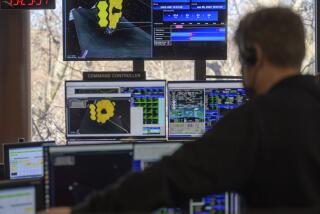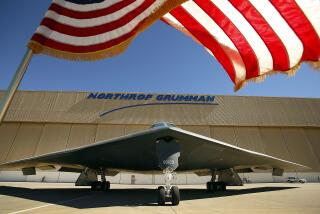Bidding War for Hughes Escalates to $10 Billion
- Share via
Two major aerospace companies battling to acquire Hughes Electronics Corp.’s defense group--one of the last remaining jewels in the shrinking post-Cold War defense industry--have boosted their offers to nearly $10 billion, people tracking the auction said Thursday.
Northrop Grumman Corp. and Raytheon Co. are locked in a hotly contested auction for Hughes’ operations, sources said, which will determine which company emerges as one of the dominant players in the defense industry.
General Motors Corp., which owns Hughes, will choose the winner within the next two weeks, sources said.
In doing so, the company will trigger the breakup of Hughes, a renowned linchpin of Southern California’s aerospace industry that was formed after World War II by the late billionaire Howard Hughes. GM bought Hughes in 1985 for $5 billion.
The outcome of the auction is likely to have a profound effect on the 15,000 Hughes defense workers in Southern California, and another 22,500 Hughes employees elsewhere in the nation. Hughes’ defense group has operations in several Southland cities, including El Segundo, Fullerton, Irvine and Newport Beach.
GM, Hughes and the other parties involved all declined comment on the sale, or what it might mean for the region’s aerospace employment. But there could be some job cuts after the sale is completed because of operations overlap, said Roger Threlfall, an aerospace analyst with J.P. Morgan Securities in New York.
“I would guess there’s going to be some job rationalization in many places, in part in California,” he said.
In the case of Los Angeles-based Northrop and Hughes, the overlap involves their airborne radar products. Lexington, Mass.-based Raytheon and Hughes overlap in missile production, notably naval missiles. However, not all of those overlapping lines involve Southern California facilities.
The potential concentration of those activities might prompt antitrust regulators to give any merger close scrutiny, Threlfall said. Defense is the biggest piece of Hughes’ operation, accounting for sales of $6 billion, or 40%, of its annual sales.
The bidders’ prices alone won’t determine which company wins Hughes’ assets, according to analysts and people involved in the auction. To accomplish the sale, GM is considering a complex transaction that, among other things, would also leave GM with a major chunk of the acquiring company’s stock. Hence, GM also must decide whether it expects Raytheon or Northrop Grumman, and their stocks, to better hold their value after the deal is completed.
Under that test, some analysts give the edge to Raytheon because the total market value of its existing stock is $11.2 billion, more than double Northrop’s market capitalization of $4.5 billion.
Sources familiar with the Hughes auction said that after Northrop Grumman and Raytheon made initial offers of roughly $9 billion Monday, GM quickly asked for their final offers.
“Then both sides rebid,” one source said. Although the exact amounts could not be determined, both were said to be approaching $10 billion.
GM is selling Hughes’ defense lines both to cash out part of its profit from buying Hughes 11 years ago and to take advantage of the flurry of mergers that is quickly shrinking the defense industry.
GM’s challenge is to figure how to structure the sale so that the auto maker can escape a huge capital-gains tax arising from the sharp rise in Hughes’ value over the past decade, the sources said.
GM also must find a way to transfer Hughes’ defense assets to Northrop or Raytheon while maintaining Hughes’ thriving space/telecommunications group, which is the nation’s leading builder of commercial satellites, as a separate entity. Hughes’ Delco Electronics unit, a maker of automotive components, will likely be folded back into GM, people following the situation said.
C. Michael Armstrong, Hughes’ chief executive, reportedly wants to stay with the telecommunications group because of its strong growth prospects in commercial markets. The group operates the burgeoning DirecTV satellite-to-home television service.
Selling Hughes’ defense lines is further complicated because Northrop Grumman and Raytheon are proposing to use $4 billion or more of their own stock to help pay for the deal.
The myriad complications are why the bidders’ proposals run into the hundreds of pages, the sources said. “It’s not just a matter of writing a price down on a piece of paper,” said one.
Hughes today mainly builds radar for military aircraft, other defense electronics gear and missiles, such as the Tomahawk cruise missile. Northrop also makes radar and other defense electronics, along with the B-2 Stealth bomber. Raytheon also makes missiles, radars and other defense electronics, including military communications, surveillance and aircraft-training systems.
Both Northrop Grumman and Raytheon have been aggressive buyers in order to survive in the face of dwindling Pentagon spending.
In 1994, Northrop outlasted Martin Marietta Corp. and won a bidding contest to buy Grumman Corp. for $2.2 billion. (Martin Marietta eventually merged with Lockheed Corp.) Last year, Northrop Grumman bought Westinghouse Electric Corp.’s defense-electronics group for $3 billion.
Raytheon, meanwhile, bought defense-electronics specialist E-Systems Inc. for $2 billion in 1995. And on Monday, Raytheon beat Northrop Grumman in a bidding contest for the missile and defense-electronics holdings of Texas Instruments, with a winning offer of nearly $3 billion.
The race to buy Hughes’ assets sent Hughes’ stock sharply higher Thursday. The stock--technically GM’s Class H shares--jumped $2 a share, to $63.125, in New York Stock Exchange composite trading. Northrop shares fell $1.375 to $77.875 on the NYSE; Raytheon lost $1.25 to $47.50.
More to Read
Inside the business of entertainment
The Wide Shot brings you news, analysis and insights on everything from streaming wars to production — and what it all means for the future.
You may occasionally receive promotional content from the Los Angeles Times.











